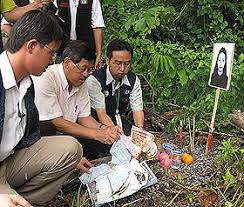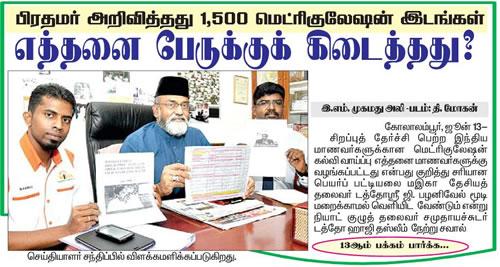
Would
it be preposterous to say that Razak Baginda was the mastermind behind
Malaysia's RM7.3 billion acquisition of two French Scorpene submarines?
It was certainly a most inappropriate purchase given the country's
shallow coastline, and worse still, the ensuing illicit commissions
scandal led to the murder of Mongolian national Altantuya Shaariibu,
casting a shadow over Malaysia and Prime Minister Najib Razak.
Really,
even Baginda's worst enemies can’t imagine him having the nerve or
capability to convince Najib, who was then the Defence Minister and
being groomed to take over the premiership, into taking part in what was
basically a huge money-making scam.
Not unless, Najib himself wanted to be persuaded or perhaps even suggested such a scheme for Baginda to research and execute!
What
about Altantuya then? Could Baginda have persuaded Najib into 'lending'
him two former bodyguards to kill off the beautiful but pesky
self-confessed blackmailer, and then bombing her body with
military-grade C4 explosives to prevent identification? Hard to say and
only Altantuya's killers will know. The problem is they are not
speaking. Or perhaps they are not ready to blow the whistle just yet.
'Soft' men
One thing for sure. Both Najib and Baginda are 'soft' men - used to fine living and chasing after their own

pleasures
with a selfish determination. Can 'soft' men show ruthless streaks when
their lifestyles are threatened? Again, hard to say.
After
all, in the 1970s, when Najib took over as the Pekan MP after his
father's untimely demise, did any Malaysian ever think the gangly and
shy young man would ever be capable of ordering the police to brutalize
civilian protesters taking part in the recent Bersih rally for clean
polls? Or did anyone ever think he would be capable of making a speech,
vowing to bathe his 'keris' (sword) with Chinese blood just before
Mahathir Mohamad's infamous Ops Lalang swoop on dissidents and
opposition leaders?
But who is Razak Baginda to Najib,
how strong was his influence? Actually, Baginda was not really
influential and did not have any established connections to either Najib
or the top UMNO leaders at all. He was neither a big time businessman
nor an underworld kingpin. The two men were not related nor were they
college or school buddies.
In fact, Baginda and Najib
had never crossed paths until Najib became the Defence Minister in 1991
and Baginda joined the Malaysian Armed Forces Defense College as a
lecturer, where he eventually rose to become the head of strategic
studies. When Najib left the Defense Ministry in 1995 for the Education
Ministry, their relationship grew closer. Baginda became Najib’s
confidant, while his wife Mazalinda and Najib's Rosmah too were on very
cordial terms.
But make no mistake. Baginda could live
without Najib, although he enjoyed being close friends with such a
prominent political figure. It was Najib, who perhaps needed his
friendship more. For sure, Najib would want to tap Baginda's brains.
Baginda was not only a defense strategist, he later also ran a
think-tank - the Malaysian Strategic Research Institute, which was
widely known to be funded by Najib and designed to further the latter's
political career.
UMNO leaders must have a lot of money to stay in power

After
losing out the deputy prime minister's post to Anwar Ibrahim, the
political horizon suddenly opened up for Najib in the late 90s when
former premier Mahathir Mohamad decided to oust the fast-rising Anwar
from UMNO.
To repay Najib for his support during the
tumultuous period when Anwar, now the Opposition Leader, was sacked and
jailed, Mahathir began grooming Najib for the premiership. But it was
not a one-way ticket, Najib too had to play his part in preparing for
the PM's chair. To secure the top post and ensure he could fight off
challengers, Najib knew he needed money.
That is the
name of the game in UMNO politics. Lots of money to buy support from the
top down to the branches and all the way to the divisions, states,
Youth and Women's wings. Now - where and how to get it?
People
following the Scorpenes scandal say Najib could have thought of a
scheme when he was the Defence Minister and discussed it with Baginda,
who given his knowledge of things military could have in turn told Najib
about the shady world of international arms procurement where enormous
bribes were the order of the day.
For example, it was
well known that in Taiwan, French company Thales, formerly Thompson-CSF,
had sold 6 DCN-built La Fayette-class 'stealth' frigates for an
exorbitant US$2.8 billion in 1992, raising eyebrows around the world,
while the Pakistan military had purchased 3 Agosta 90 B submarines in
1994 just as controversially.
Why Baginda?

Malaysia's
own purchase of the Scorpenes from DCNS was brokered by Razak Baginda.
Why him, and not some high-flyer corporate baron?
Some
pundits say Najib was more than aware that previous UMNO prime ministers
had used cronies and proxies to front their money-making schemes. But
'stars' and corporate captains could sometimes be risky and having a
trusted confidant like Baginda manage the money-flows might have seemed a
more ideal way to Najib. If the allegations against Najib are true,
surely he would want to control the funds and ensure these were always
within his reach.
The Scorpenes deal is believed to
have been on the table since former Finance Minister Daim Zainuddin's
time but was frozen after Daim fell out with Mahathir. When Najib
returned to the Defense ministry, it is believed Mahathir agreed to let
him revive the transaction. And so like two schoolboys, Najib and
Baginda allegedly plotted and schemed over how to benefit from such a
large procurement. Even the razor-sharp Rosmah did not know of it at the
beginning, or so the speculation goes.
As for
Altantuya, she basically had no special skills and was not really a good
translator even. She was never part of the scheme - just a very pretty
face and a sexual diversion for both men. Due to her travels with
Baginda, she came to know enough of the Scorpenes transaction to later
try and blackmail him for a cut of the illicit commission paid by DCNS.
For the record, Baginda has admitted being lovers while Najib has said
he never knew her at all.
Meanwhile, perhaps to ensure
maximum secrecy, Baginda got his family members involved. Several
business entities were created such as Perimekar which was wholly owned
by another company, KS Ombak Laut Sdn Bhd, which in turn was also
controlled by Baginda and his wife. And to make the money trail a bit
longer Baginda created another company Terasasi (Hong Kong) Sdn Bhd with
his father Malim as a director.
Possibly, the group's
thinking then was that with the Defence Minister and the future Prime
Minister involved, how could things go wrong? Even if they were caught,
they would be let off the hook! It was their own 'perfect' scheme but
sad to say, unknown to the two wives, both Najib and Baginda were having
affairs with Altantuya and unknown to all of them, Altantuya wasn't
about to let herself be 'screwed' for free.
Caught with their pants down
When the 28-year-old beauty found out that the Scorpene deal was successful and Perimekar had received

the agreed commission, Altantuya could smell the money even from Mongolia, so to speak.
She
decided to get something for herself and came to Malaysia. Whether or
not she had really been promised a share of the loot is hard to say. Why
didn't they just pay her off? Was it really because Rosmah got jealous?
But would someone so shrewd and money-conscious become so emotional?
What was the trigger?
Again, Malaysians and the world
will have to wait before the dots can be connected and the picture drawn
out. Whatever the truth, Altantuya blackmailed Baginda, threatening to
expose the sexual affairs with him and Najib. After all, as her father
Setev Shaariibuu has said, she did have photos of the three of them
together as 'proof'.
Now, Altantuya meant trouble to
Baginda and Najib. Big trouble which had to be dealt with immediately or
Najib's hopes of becoming the next prime minister would fizzle up in
smoke if he was indeed involved. But what to do? How to react? This part
of the scheme had never been thought out before and the alleged duo
were practically caught with their pants down, hence the panic and
spontaneous reactions.
When Altantuya arrived in Kuala
Lumpur with her cousin Burmaa Oyuchimeg, she engaged a private
investigator to help her check out Baginda. Altantuya had witnesses and
other records to confirm her presence in Malaysia despite Immigration
computers that showed she had never entered the country. She really did
make life complicated for Baginda. Her kidnapping was carried out by
agents from the Malaysian Special Branch in broad daylight in front of
Baginda’s house - even with witnesses present. That was how desperate
Baginda was. Malaysian media have not published the full details, but
foreign press have.
It was the cab-driver who messed up their 'perfect' plan

As
is usually true in such covert operations, it’s the small details that
matter. The entire operation came undone due to the non-payment of
Altantuya’s cab fare. The taxi driver hired by Altantuya for the day did
not appreciate that his passenger had been kidnapped from right under
his eyes without payment for the fare. He took note of the registration
plate of the kidnapper’s car – and filed a complaint at the local police
station. This established that the kidnappers’ car was a government
vehicle, and fingered its owners.
Najib was allegedly
too stunned to think clearly. Baginda decided to hire third parties to
help out and private-eye P Balasubramaniam was brought in to do some
fact finding because they did not have the luxury of time. The whole
Scorpene deal could just explode. It was too big to handle and too risky
at that political juncture in Malaysia for both UMNO and Najib. The
money trail was long but straight forward such that both Najib and
Baginda could be easily traced.
Najib is believed to
have entrusted the matter to his private secretary Musa Safri to do
whatever was necessary. It has been reported that Rosmah, being nosy,
smelt something was amiss and correctly guessed that her husband was in
deep trouble. Perhaps she nagged him but whatever it was, the PM-to-be
is said to have spilled the beans to his wife.
Now -
and this has been confirmed by the elderly folk in her own village -
Rosmah is not someone you play with. She is ruthless - no question marks
there at all. But did she as it was reported carry out her own hunt for
Altantuya? Did she command Najib's two personal bodyguards, Sirul Azhar
and Azilah Hadri, as well as her own trusted military aides Norhayati
and Aziz Buyong to help her deal with Altantuya?
Only
they would know and they are not telling. Not yet, anyway. If Altantuya
was still alive, she could be a witness in any court case pertaining to
the scandal. Her involvement would have made things even more complex
and stinky for the Malaysian government because the matter would then
carry an international dimension. Such publicity would obviously be bad
for the Malaysian leaders.
As it turned out, Altantuya
was murdered and her remains were destroyed with C-4 on October 18, 2006
in a deserted area in Shah Alam at outskirts of Kuala Lumpur.
But why must Altantuya be killed?

The
scandal was in fact a ticking time bomb for Najib and it had landed in
UMNO’s lap. Any implication sticking to Najib who assumed office as
prime minister in April 2009 would be devastating. Najib had also been
the Deputy Prime Minister and UMNO deputy president since 2004 and was
being groomed to take over from the then premier Abdullah Badawi.
Badawi
was at that time struggling to stay in power. He could not decide what
to do. Musa Hassan who was the Inspector General of Police when the
scandal unfolded declared recently that he had told Badawi that Najib
was not involved in the murder.
Mahathir who has been
abnormally quiet over the Scorpenes-Altantuya scandal has never
commented much on the matter. But according to UMNO insiders, he was
actually on top of things. He knew what was going on as he still had
spies in the Special Branch. Sensing Badawi would be of no help in such a
critical situation and that Najib lacked shrewdness, Mahathir decided
to intervene. He convinced the IGP that no matter what, UMNO must be
saved.
Najib would then be told to let the police
handle the murder investigation and he was in turn to tell Rosmah to go
along with whatever the police did. UMNO - which the latest documents
seized by French police showed also had a stake in the Scorpenes
commission - too wanted the whole scandal to be suppressed. So how else
but the usual political arm-twisting. Make use of the judiciary and rig
the trial! Sounds familiar?
But no matter how many
Qurans or holy books Najib swears on, it is impossible for anyone who
goes through the case to not think he was directly involved in some way
or other. Same goes for UMNO, Baginda and Rosmah. Whether anyone of
these parties actually ordered Altantuya's killing is premature to guess
for now. It is still possible to know the truth as the two bodyguards
who shot and bombed her are still alive on death row, appealing their
hanging sentences.
And one day, the two killers might
just decide to come clean. Even if they 'disappeared' as many Malaysians
fear they might, the truth can still be uncovered because there are so
many intertwined documents and witness accounts. All it takes is an
honest-to-goodness police investigation and a fair and un-rigged court
trial or public inquiry! Then even if the Scorpenes money takes years to
recover, at least the ghost of Altantuya can finally be laid to rest.
And the Malaysian flag fly high in the sky without the shadow of murder
blotting its glory.
Malaysia Chronicle
 "He is right. I am afraid.
"He is right. I am afraid.  "He is right. I am afraid.
"He is right. I am afraid. 









